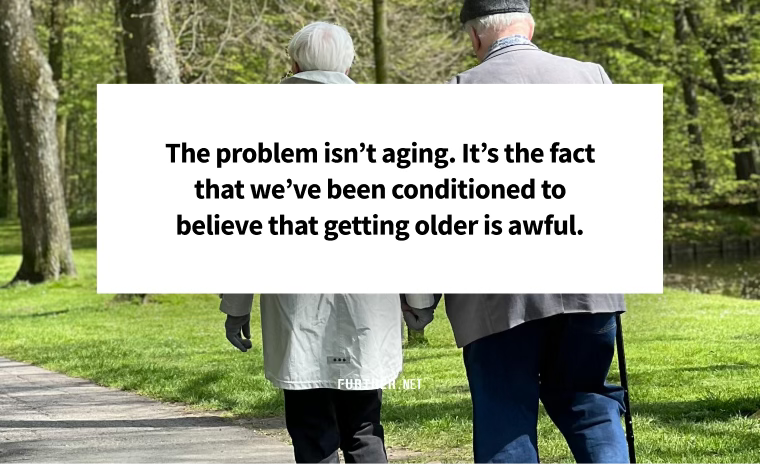You Only Get “Old” When You Believe These Myths About Aging
Here’s a sampling of seven counterintuitive facts about getting older.
When you think about older people, what stereotypes immediately come to mind?
Frail, weak, slow, clumsy, clueless, confused, forgetful, helpless, unhealthy, unattractive, uncool, and bad at driving.
Whoops, my bad… These are traits I observed in people of all ages while waiting on a flight at the Denver airport (the bad drivers were on the way there). The truth is, very few people live up to our media- and marketing-induced notions of being young, cool, and attractive… even the young themselves.
But the general consensus seems to be that it’s better to be young than old. Most people over the age of 50 will tell you it’s the exact opposite, but younger people likely don’t believe it until they’re lucky enough to get there.
We live in a youth-obsessed society. That means we’ve all been swimming in ageist beliefs our entire lives to such a degree that we don’t even realize or question them.
It’s like the joke about the older fish who approaches a couple of younger fish and says, “How’s the water?” As they swim away, one young fish looks at the other and says, “What’s water?”
Ageism is defined as discrimination against older people because of negative and inaccurate stereotypes. And it’s so ingrained in our culture that we often don’t even notice.
It’s remarkable when you think about it. A large percentage of the population wouldn’t dare make a racist or sexist joke, but casually ageist comments rarely raise an eyebrow.
People of all ages — including older adults themselves — show bias against older people, which is odd given that everyone lucky enough to live a long life will reach this designation eventually.
And it’s not benign. Ageism is a massive drain on economic prosperity and a blight on society. But the most maddening thing is it’s based on things that just aren’t true.
Sunlight is the Best Disinfectant for Ageism
Here’s a sampling of seven counterintuitive facts about getting older:
After age 50, people tend to become happier and enjoy more life satisfaction than at any other time since childhood. And this happiness increases as you get even older, into your 70s and beyond.
Older adults generally enjoy better mental health and higher levels of emotional regulation. Research also shows that older people have the wisdom and experience to handle stress better than younger people.
Only 2.5% of Americans over 65 reside in a nursing home, and three-quarters of people 85+ live their lives without personal assistance.
Dementia (which includes Alzheimer’s disease) affects only 10% of all people over the age of 70. Two-thirds of people over age 85 are not afflicted at all with any form of dementia.
As a measure of cardiorespiratory fitness, VO2 max starts to decline in our 20s and falls off a cliff after age 50. But proper training can erase 50 years of decline. The VO2 max of athletic 80-year-olds is equal to that of healthy 35-year-olds.
Muscle loss with age, known as sarcopenia, typically begins around age 30 and accelerates after 50. But strength training can largely counteract this process by increasing the size of existing muscle fibers and improving neuromuscular efficiency, helping maintain overall muscle mass and athletic performance well into later decades.
Mental deficits that accompany aging are largely optional, because the brain remains plastic throughout the lifespan. Many age-related declines in cognitive control may be reversed through physical and cognitive training.
The problem isn’t aging. It’s the fact that we’ve been conditioned to believe that getting older is awful. As with healthspan, educating yourself about the realities of aging can literally add years to your life.
In other words, it’s a problem when older people buy into ageist beliefs they may have carried with them for decades. This is because what people believe very much determines how vibrant and active their later years are.
Do Stop Believing (the Wrong Things)
Human beings are essentially bundles of beliefs that make us who we are and dictate how we behave. And what we believe has very significant consequences for how reality unfolds for us.
For example, the difference between an empowering growth mindset and a crippling fixed mindset is the simple belief that you are capable of positive change.
Then there’s the Galatea effect (or a self-fulfilling prophecy), where when you believe in your ability to achieve a goal you’re more likely to achieve it.
And there are many astounding examples of the placebo effect, which can result in measurable physiological changes even though no active agent is administered.
The same is true for what we believe about aging:
People who take in more negative age beliefs tend to show worse physical, cognitive, and mental health. But the good news is that those who are exposed to or develop more positive age beliefs tend to show benefits in physical, cognitive, and mental health.
In 2002, psychologist Becca Levy published a longevity study that followed residents ages 50+ in a small Ohio town for over two decades. Incredibly, she found the median survival was seven and a half years longer for people with the most positive views about aging than those with the most negative beliefs.
“We take our beliefs from culture and start absorbing these beliefs as young as 3 years old. Our beliefs on older people can come from social media, advertising, the antiaging industry, movies or books. It can differ quite a bit between cultures,” Levy said.
Another interesting aspect of getting older is the phenomenon of subjective age. Basically, most older people think of themselves as younger than their chronological age, which can be a telling sign of both their health and attitudes toward aging.
Interestingly, this disparity between how many birthdays you’ve had and how old you feel is increasing with today’s middle-aged adults. This is good news for Generation X, because feeling younger than you are means you have better physical and cognitive health, higher well-being, greater stress resilience, and lower mortality hazards.
No one knows why the experience of subjective age happens. Could it be that arriving at a certain age is nowhere near as bad as you imagined it would be when you were younger, and therefore you don’t “feel” that age? That’s a perfectly logical outcome when you’ve been raised to think that being young is ideal and being older is something to dread.
Even while maintaining positive attitudes towards aging, we still can succumb to false stereotypes about ourselves. Take memory, for example.
Getting older, on average, leads to a subtle decline in memory, but nowhere near the stereotypical levels attributed to “forgetful” older people:
The fact older people tend to blame every memory failure they experience on their age is a symptom of the ageism their semantic memory was feeding them, which in turn perpetuated the stereotype.
In other words, jokes about having a “senior moment” are potentially more harmful than we may think. Everyone forgets things, but only older people blame it on their advancing age.
(Remember that.)
Once again, education is the key to changing both realities and perspectives about aging. Negating ageist stereotypes comes down to affirming for older people what they’ve come to suspect: getting older isn’t as bad as they thought, and in fact, can be incredibly satisfying.
Not the Same Old Story
This brings us back full circle to what Further is all about. Whether or not you have “just enough” retirement savings isn’t the issue.
The issue is you’re a viable human being at the height of your powers, and you have a chance to do remarkable things over the next 20 or more years. While not all Americans are in this position, if you are, it would be a shame to squander it.
There’s nothing significantly “old” about the age of 65. It was just a number chosen by economists back in the 1930s, when the job market focused much more on physical labor than our current knowledge and information economy.
Now, healthy people are living longer lives and, more importantly, gaining more active years free of debilitating illness. Your biological age may be much lower than your chronological age.
For Gen X, the prospect for even greater longevity and vitality is bright, as long as we take care of ourselves now. So, it stands to reason that many of us will see no reason to stop working at 65, 70, or even higher — if we’re still into what we’re doing, which is key.
Given the lack of retirement savings for many and the universal fear of outliving one's money, this is a welcome ray of light. More immediately, when our attitudes about aging change, there are things other than retirement to focus on:
Of all ages tested, middle-aged people are most likely to change their attitudes on aging after being exposed to more authentic depictions of aging and older people, signaling that people of this age group may be an ideal target for shifting attitudes about aging in a more positive direction.
This is why I’m playing the long game with Further. With most of us in our 50s headed toward our seventh decade, we can adopt positive attitudes about the aging process by simply understanding the facts that contradict ageist stereotypes.
In other words, you may be putting up with me for a long time as we navigate these uncharted waters together. Come on, it could be worse. 😏
With the right frame of mind about getting older, you can play your own long game and shift your focus to becoming who you want to be during your next stage(s). This emphasis moves you away from “over the hill” to an aspirational future self that is strong, independent, and actively living a long, prosperous life.
Keep going-
P.S. Due to my travel schedule, there will be no free newsletter next Tuesday. Premium lessons will go out this Thursday and next as usual. Thanks!
further: flashback
🎶 Rage Against The Machine - Renegades Of Funk, Renegades, 2000 🎶
For their fourth and final studio album Renegades, RATM recorded nothing but cover songs, including Renegades of Funk. But have you ever heard the original version by Afrika Bambaataa & Soulsonic Force? The Rage version is a bit more… intense.(YouTube)
further: sharing
Enjoy this issue? Please forward this email to friends or share by clicking below:
Or you can earn access to Further Premium by recommending Further in general.
Grab your unique referral code here.
Thank you for sharing Further!




"Age 50 isn't game over. It's game on!"
I love that you included, "younger people likely don’t believe it until they’re lucky enough to get there."
Yes, each year now on my birthday, I don't think "I'm getting older"; I think "how great it is that I have the privilege of living this many year."